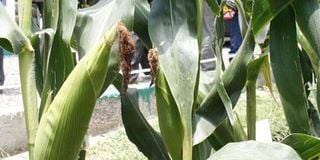Premium
Alarm as farmers in North Rift hit by maize seed shortage

The scarcity of high-yielding maize seed varieties has left farmers contemplating using uncertified and poor-quality seeds.
What you need to know:
- Farmers in West Pokot and Trans-Nzoia counties hit by acute maize seed shortages.
- Scarcity has left farmers contemplating using uncertified and poor-quality seeds.
Joseph Longurosya travelled more than 30 kilometres from his Mutua village in Trans-Nzoia County to Makutano Township, Kapenguria, in West Pokot County on Friday hoping to return home with maize seeds.
However, Longurosya, who owns three acres of land, failed to get the maize seeds, and his hopes of a bumper harvest this season just dimmed big time, coming so soon after the much-publicised fake fertiliser ruckus.
He is not alone. Thousands of farmers in West Pokot and Trans-Nzoia counties have been hit by acute maize seed shortages this planting season raising concerns across the farming community in the North Rift region.
“I have visited all the shops but found nothing. I use 2,500 kilogrammes of maize seeds and I feel I will delay planting this time round. I plant the 6213 variety, but it is not in stock. Last year, we had no such problem,” he told Nation.Africa.
Mr Longurosya has made several trips to Kapenguria and Kitale towns the whole of the past week without success.
“I have wasted a lot of money on transport,” he laments.
Farmers now fear that the lack of appropriate seeds could delay planting and signal a poor harvest and hunger at year-end.
West Pokot County soils find 6213, 614 and 629 maize seed varieties most suitable. However, it has been reported by various agro vet shops across the region that the most sought-after suitable maize seed varieties are currently out of stock.
This scarcity has left farmers contemplating using local but uncertified and poor-quality seeds that are ill-suited for their specific areas. Therein lies the threat to maize production.
Certified stockists buy directly from Kenya Seed Company (KSC).
Farmers are asking the Government to urgently address the shortage of 6213,614 and 629 drought-resistant and high-yielding maize seed varieties that do well in the region.
A spot check in agrovets in Kapenguria town, at Sondany Enterprises, Paves Vetagro Ltd, Kipkomo Farmers Agrovet, Lelan Chemists, and Lelan Agrovet, found the varieties out of stock.
Some farmers have resorted to other maize seed varieties like KH 500-43A and Pannar from the East African company.
Other maize seed varieties available are DK &031, Pan 691, WH 5092, WH 101, and Pioneer.
A farmer’s official in the region Richard Mwareng says that the maize seeds selling out in the region were not from the Kenya Seed Company.
They buy maize seeds at Sh2,500 per 50-kilo bag and Sh440 per 2kg but Mr Mwareng who farms at Chepchoina scheme and in Kapenguria has not planted yet.
He says farmers are facing difficulties accessing maize seeds at KSC, adding that he spent over two days in a queue to get his hands on some seeds in Kitale, yet he didn’t even get the amount he had anticipated.
Mr Mwareng also raised concern over the shortage of planting fertiliser from the National Cereals and Produce Board.
“Some 5,000 others are yet to get any. [At the queue, I have been listed as] Number 2,700 and I don’t know if I will get the fertiliser,” he says.
However, KSC has assured farmers of adequate seed and advised them to buy only from certified agents to prevent any distribution of fake seed in the market.
The company has reported a rise in the demand and uptake of its seeds, leading to stockouts and constant restocking to bridge the deficit.
The chairperson of the company Purity Ngirici told the press on Friday in Kitale that KSC has sufficient seed in its stores to meet the blooming demand.
She said a crackdown by the government on fake seeds has seen farmers opt for top-quality seed from KSC, the high demand that is driving the perceived shortfalls.
As part of the company’s strategy to ensure farmers get served, Mrs Ngirici noted that KSC had adjusted its working hours to cater for the higher number of farmers thronging seed stockists.
KSC Managing Director Sammy Chepsiror said the company will double its seed production to curb such challenges in subsequent planting seasons.
The country's demand for maize seed stands at 51 million kilogrammes. The company will cultivate 41,000 acres during the current planting season up from last year's 21, 000 acres.
“We have put in place all the necessary measures to meet the target, as we possess sufficient capacity in terms of land and contracted growers to achieve it,” Mr Chepsiror said.
He said the seed producer has collaborated with officials from the Kenya Plant Health Inspectorate Service (KEPHIS) and county security teams to address instances of counterfeit seed sales.
“We challenge our farmers to stay vigilant by ensuring they purchase our products from certified stockists and follow the guidelines to confirm the genuineness of the seed,” said Mrs Ngirici.
Mr Chepsiror said the Company has a fully functional security department to monitor and gather intelligence on producers of fake seeds across the country.
Kenya Seed Company usually sells inputs to farmers through agents, stockists, and its branches countrywide and main shop at its Kitale headquarters.
Critics say there is a danger only when farmers opt for low-quality seeds, which works contrary to the government’s quest for national food security.
The region’s maize production is also expected to decline due to the shortage of seeds this planting season despite favourable weather.
Kenya Seed Company, a state corporation that controls about two-thirds of the market, insists that maize seed is available and in adequate quantities and warned against the advent of unscrupulous traders selling non-certified or unsuitable seeds disguised as genuine things.





